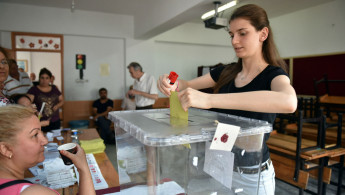Turkey votes in high stakes elections
Turkish voters went to the polls Sunday in the most-closely fought legislative elections since the Islamist-leaning ruling party came to office 13 years ago, in a crucial test for President Recep Tayyip Erdogan.
Ballot stations opened at 0500 GMT and will close at 1400 GMT, with over 53.7 million Turks eligible to vote.
Opinion polls predict that the ruling Justice and Development Party (AKP) co-founded by Erdogan will again win the most votes, but its share could be sharply down on the almost 50 percent it gained in the last such vote in 2011.
Erdogan is hoping the party will win a crushing victory in the vote, allowing it to change the constitution and hand him broad presidential powers.
However the opposition HDP, expected to come fourth, could scuttle his plans if it wins over 10 percent of the vote and surpasses Turkey's notoriously harsh threshold for sending MPs to parliament.
The party is attempting to move beyond its Kurdish roots and draw support from centre-left and secularist sympathizers as Erdogan's religious tone has become more pronounced.
Erdogan wants the AKP to win a two-thirds majority in seats, which would be enough to agree a new constitution to change Turkey from a parliamentary to a presidential system where the head of state is enshrined as number one.
He argues this would be little different from democracies like France and Brazil and change an old constitution that has its origins in a 1980 military coup. Opponents fear it could mark the start of one-man rule.
A strong showing from the second-ranked secular Republican People's Party (CHP) and third placed Nationalist Movement Party (MHP) could even force the AKP to form a coalition to stay in power for the first time since it came to office in 2002.
'Too close to call'
Ahead of the vote, HDP leader Selahattin Demirtas launched a strong attack on Erdogan, criticizing him for going ahead with an election rally on Friday after two bombs tore through a HDP election rally in the city of Diyarbakir in the mainly Kurdish southeast, killing two and wounding at least 200.
Demirtas also accused pro-government newspapers of giving scant coverage of Friday's attacks. He held up their front pages as he spoke to thousands from atop a campaign bus.
"I know we are angry, but we will not act in anger. We will act in good conscience. We will be smart and we will give our answer at the ballot box and stand up for our country," he said.
The attack in Diyarbakir was just the latest against the party in the campaign as it tries to break into the mainstream of Turkish politics.
Erdogan, who lashed out at opponents in all directions, including several foreign media publications like Britain's The Guardian and the New York Times, concentrated his most severe fire on the charismatic Demirtas, belittling him as a "pretty boy" who is merely a front for Kurdistan Workers Party (PKK) separatist militants.
Demirtas has himself acknowledged that the election is on a "knife-edge", with the HDP's share of the vote hovering just above or below the crucial 10 percent threshold level.
"The final result is too close to call, as small, last-minute shifts in electoral preferences could make all the difference," said Sinan Ulgen and Marc Pierini, visiting scholars at Carnegie Europe in a report on the elections.
Meanwhile, the CHP has sought to play on perceived excesses of the ruling party, even accusing Erdogan of having golden toilet seats in his new presidential palace in Ankara.
Erdogan's heavy involvement in the campaign is itself controversial, given that as head of state he is required to keep an equal distance from all parties. But he has made no secret of his favour for the AKP.
The AKP is now led by Prime Minister Ahmet Davutoglu, a former foreign minister who has driven himself hoarse with a relentless campaign of populist speeches across the country to impress voters.
The party is seeking to convince the electorate with its hugely ambitious infrastructure projects, including a third airport for Istanbul and a multi-layer tunnel under the Bosphorus.
"The second half is beginning," says one of its main campaign slogans, implying another decade of ambitious projects.





 Follow the Middle East's top stories in English at The New Arab on Google News
Follow the Middle East's top stories in English at The New Arab on Google News
![Israeli forces ordered bombed Gaza's Jabalia, ordering residents to leave [Getty]](/sites/default/files/styles/image_330x185/public/2176418030.jpeg?h=a5f2f23a&itok=_YGZaP1z)

